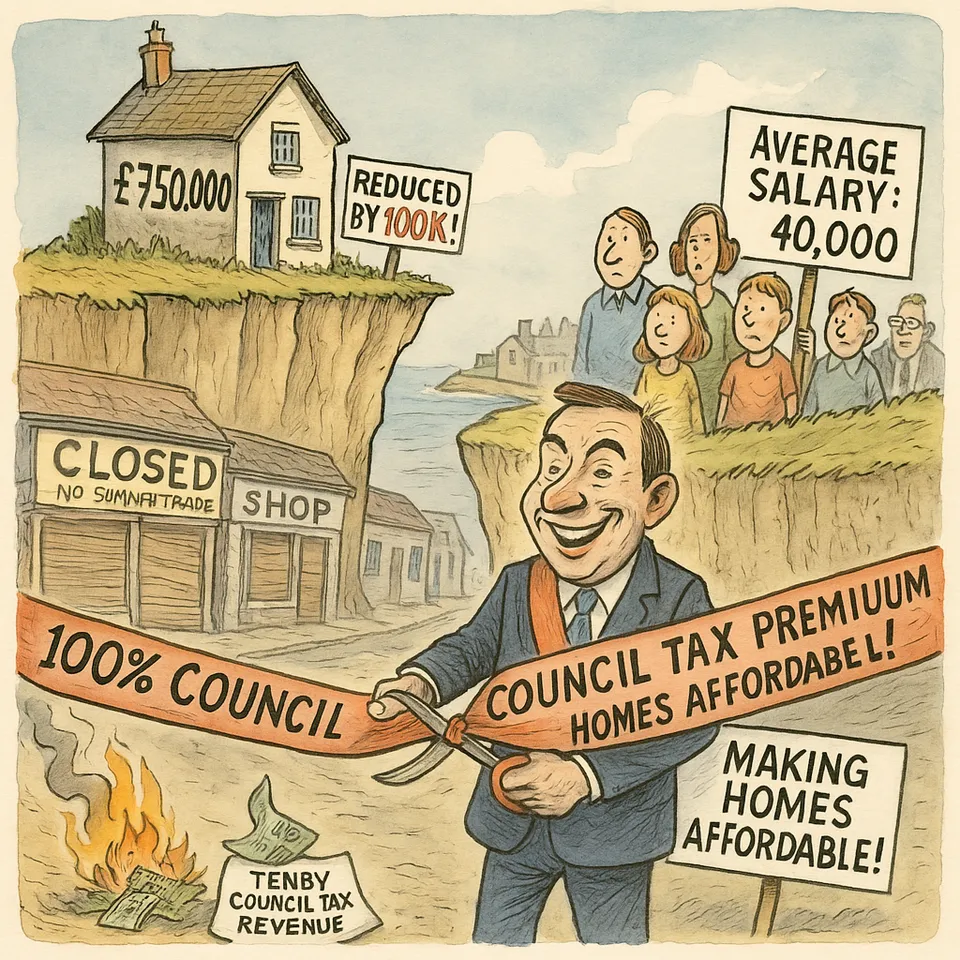Council Tax War on Second Homes Achieves Precisely Nothing

Punitive premiums create unsold properties, not local buyers
The government promised that punitive council tax premiums would free up homes for local buyers. Eight months later, the data reveals a textbook case of British policy failure: properties nobody wants, markets nobody can navigate, and communities bleeding economic vitality.
Commentary Based On
The Telegraph
We knocked £100k off our second home, but locals don’t want to buy it
Since April 2024, over 200 English councils imposed 100% council tax premiums on second homes. The stated goal was simple: force wealthy outsiders to sell, allowing locals to buy. The actual results tell a different story entirely.
Property markets in tourist areas are now clogged with unsold second homes. King’s Lynn shows a 52% surge in properties for sale compared to last year. North Norfolk reports 30% more listings. Yet these homes aren’t selling to locals - they’re not selling at all.
The Godfreys knocked £100,000 off their Pembrokeshire cottage, dropping from £850,000 to £750,000. Still no local buyers. Why? Because the average Pembrokeshire property costs £245,000 - what locals can actually afford. The gulf between political fantasy and market reality spans half a million pounds.
In Salcombe, where the council eagerly implemented the 100% premium, starter prices begin at £750,000. Local salaries average £40,000-50,000. The mathematics of this “affordability” policy would be comedic if the consequences weren’t so destructive.
Critical Analysis: How Not to Run a Country
This isn’t mere policy failure - it’s symptomatic of how British governance now operates. Politicians identify genuine problems (housing affordability), then implement solutions that demonstrate zero understanding of basic economics, local markets, or human behavior.
The policy assumed second home owners would simply accept doubled tax bills. Instead, they’re selling. It assumed these properties would suit local buyers. They don’t - they’re holiday cottages in remote locations, often damp and impractical for year-round living. It assumed price drops would bridge the affordability gap. In reality, a £100,000 reduction on an £850,000 property helps nobody earning £40,000.
Most revealing is Tenby’s rapid reversal. After implementing a 200% premium in April 2024, the Welsh town slashed it to 150% just six months later, citing “devastating consequences on the local economy.” Property prices fell 21% year-on-year. The council discovered what any competent analysis would have predicted: second home owners support restaurants, shops, and seasonal employment. Remove them, and you gut the economic ecosystem.
The Pattern: Theatrical Politics, Real Damage
This exemplifies modern British policymaking perfectly. Face a complex problem requiring nuanced solutions? Apply a blunt instrument that sounds tough but achieves nothing. When it fails, double down or quietly retreat while hoping nobody notices.
The housing crisis is real. Young people can’t afford homes. But targeting second homes - which comprise a tiny fraction of total housing stock - while ignoring the actual drivers (planning restrictions, population growth, monetary policy) is performative politics at its most destructive.
Estate agent Jamie Jamieson observes that prices need to fall 30% for locals to buy. But if properties worth £750,000 dropped 30%, they’d still cost £525,000 - still impossible for average earners. The policy’s basic arithmetic never worked.
What This Really Means
Across Britain, councils are discovering that you cannot legislate market realities out of existence. Properties sit unsold, local economies suffer, and the young families this was supposed to help remain priced out. Meanwhile, the actual beneficiaries are estate agents handling distressed sales and wealthy buyers who can weather the storm to snap up discounted properties later.
The Ministry for Housing’s spokesman claimed councils need these powers because “too many second homes… exacerbate this crisis by driving up housing costs.” But the evidence shows the opposite: forcing sales hasn’t reduced prices to affordable levels, hasn’t helped local buyers, and has damaged the economic networks these communities depend on.
The Bigger Picture
This isn’t about defending second home owners. It’s about competent governance. A serious country would address housing through planning reform, infrastructure investment, and economic rebalancing. Instead, Britain opts for gesture politics that creates new problems while solving nothing.
The second homes tax premium joins the growing catalogue of British policies that achieve the opposite of their stated intent. From Help to Buy inflating prices to stamp duty holidays creating temporary distortions, every intervention makes the underlying problem worse while politicians claim victory.
Watch what happens next. Councils will quietly reduce premiums like Tenby, or maintain them while local economies hollow out. Properties will eventually sell - to wealthy buyers at discounted prices, not local families. The housing crisis will deepen. Politicians will find a new scapegoat.
This is how decline works: not through dramatic collapse, but through accumulated failures of basic competence. A country that cannot connect policy to reality, that prefers theatrical gestures to boring solutions, that damages functioning systems while failing to fix broken ones.
The second homes debacle isn’t the disease - it’s a symptom. The disease is a governing class that no longer understands how anything actually works.
Commentary based on We knocked £100k off our second home, but locals don’t want to buy it by Jayne Dowle, Maya Wilson Autzen on The Telegraph.